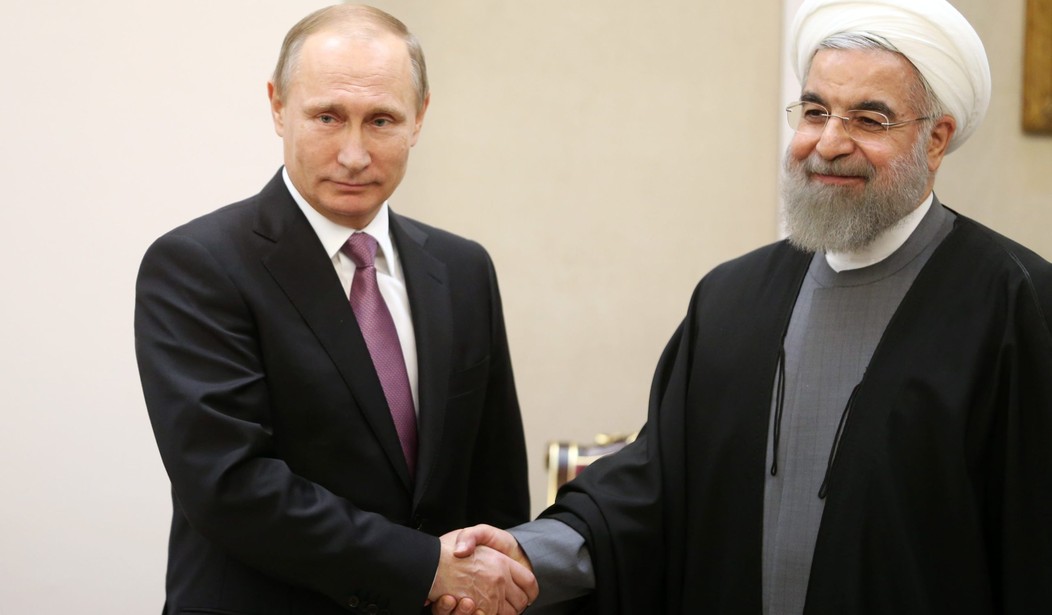Eli Lake explains “What Kerry Should Do to Divide Iran and Russia.”
This sounds like a long shot, and in many ways it is. But it’s unprecedented for Iran to allow a foreign military to operate on its soil. Iran’s constitution, following the 1979 revolution, specifically prohibits this kind of thing. It’s one of the reasons why revolutionaries took over the U.S. embassy in Tehran, which they saw as a den of spies that secretly controlled their country.
Hence Iran’s Supreme National Security Council Secretary, Ali Shamkhani, spoke about the Russian announcement euphemistically, telling the Fars News Agency that Iran and Russia had an agreement to share facilities, not an agreement for the Russian Air Force to occupy a military base.
“There are a lot of optics the Iranians have to worry about because of this,” Matthew McInnis, a former Defense Intelligence Agency Iran expert and scholar at the American Enterprise Institute, told me Tuesday. “They don’t like to admit the Russians are doing this right now.” He added, “The Iranian leadership will have to spin this in a way that doesn’t look like the country is inviting foreign forces on its soil, which it has not had since 1979.”
Kerry should exploit this. He could deliver a speech at the U.N. General Assembly congratulating Iran on finally getting over its inordinate fear of imperialism and seeing the value of a great power’s military generosity. The State Department could produce Farsi materials on the 19th-century treaties of Gulistan and Turmenchay, in which the Russian empire humiliated the Persians.
Where to begin?
What I’ve been calling the “Russo-Iranian Axis” started to emerge a year ago, out of the rubble of Obama’s failed Middle East policy. If the Obama administration had any real intention of cleaving Moscow and Tehran, the time to begin would have been then. Instead, what’s left of Obama’s Middle East policy seems to consist of not much more than performing “escallatio” on ISIS, and hoping that someone, anyone, will clean up his mess for him.
Trickier still is this notion of John Kerry going to the UN to troll the mullahs’ regime, or the State Department trolling a couple of 200-year-old treaties between the Russia and Persia.
Conceptually, Lake is kinda brilliant here. Giving the world — in Farsi! — a reminder of Iran’s abuse from the Russian military would play on the Persian people’s deep patriotism and even deeper sense of history. Presumably, Kerry’s comments and State’s documents would make it past Tehran’s censors, enraging Iranians against their own government. In Lake’s hypothetical, the mullahs might very well have to tell the Russian Air Force to bug out. And wouldn’t it be nice for once for the mullahs to be on the receiving end?
Conceptually, however, is where the brilliance ends. We need more ideas like Lake’s, but just as importantly we need leaders with the daring to implement them.
The stakes with Iran were arguably higher when the Green Movement rose in protest of Iran’s fraudulent 2009 election. Obama couldn’t be bothered to speak up in defense of the Iranian people, even as they were being shot in the streets. It was more important then for Obama to keep his Iranian “negotiating partners” in power so that he might get his “historical nuclear deal” with them. Keeping them in power is just as important to Obama today, so that he might keep his one sad foreign policy accomplishment.
So, no, odds are slim that w’ll be trumpeting longstanding Iranian grievances against Russia.
The view from Moscow or Tehran isn’t amenable, either.
The Iranians and the Russians are having too much fun together humiliating the American empire, to worry much about some fanciful rhetorical stunt by Kerry. Iran has dealt Obama and Kerry humiliation after humiliation, the latest of which was the taking of new hostages almost immediately after Obama paid a whopping $400 million to secure the release of the previous batch of hostages. Using the Russians to cause even further humiliation must have toes curling in Rouhani’s bedroom at night.
The treaties Lake mentioned ended a pair of wars fought between Russia and Persia in the early part of the 19th century, establishing Moscow’s hegemony over formerly Persian lands in the southern Caucasus, and forcibly opening Persian markets to Russian interests. But this isn’t the 19th century. Moscow and Iran have much to gain from working together, such as helping one another undermine Western sanctions, and finding some means of undermining American energy production. Iran needs Russian help to restore its de facto territorial gains in Iraq, and to help protect the Assad regime. Russia finds it useful to have even temporary access to Iranian airfields, and if that works out then — who knows? — maybe someday the Russian Navy will enjoy access to Iranian facilities on the Persian Gulf.
Lord Ismay, the first secretary general of NATO, quipped that the purpose of the alliance was “to keep the Russians out, the Americans in, and the Germans down.” The purpose of the Russo-Iranian Axis is to keep the Americans out, Assad in and ISIS down.
For now then, the only way to separate Moscow and Tehran is, as the punchline to the dirty old joke goes, “with a crowbar.”










Join the conversation as a VIP Member